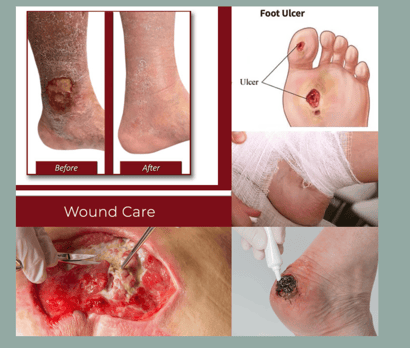Welcome ! Bienvenue! Bienvenido! Bun Venit! ようこそ (Yōkoso)
Nurse for Wound Care
Signs You Need a Skilled Nurse for Wound Care. Below, I’ll outline key signs that indicate it’s time to involve a skilled nurse in your wound care journey.
NURSING BLOG
Mihaela Schmitz, LVN
12/10/20243 min read


Caring for wounds may seem straightforward, but when healing doesn’t progress as expected or complications arise, it’s time to consider professional intervention. A skilled nurse specializing in wound care brings the expertise and advanced techniques needed to ensure proper healing and prevent infections. Below, I’ll outline key signs that indicate it’s time to involve a skilled nurse in your wound care journey. This blog blends clear explanations with medical terminology to guide you effectively.
1. Slow or Non-Healing Wounds
Wounds that fail to show significant improvement after two weeks may be classified as chronic wounds. These could include diabetic foot ulcers, venous ulcers, or pressure sores. Slow healing often signals underlying issues such as poor circulation, infection, or improper wound care. A skilled nurse can identify the root cause and implement advanced treatments, such as specialized dressings or compression therapy, to promote healing.
2. Signs of Wound Infection
Infections are one of the most common complications in wound healing. Warning signs include:
Erythema (redness) spreads around the wound.
Swelling, increased warmth, or tenderness.
Purulent discharge (pus) that may be green, yellow, or foul-smelling.
Fever or chills, which could indicate a systemic infection.
A skilled nurse can assess these symptoms, clean the wound using aseptic techniques, and coordinate with your doctor if antibiotics or further interventions are necessary.
3. Excessive or Persistent Drainage
While a certain amount of exudate (wound fluid) is normal during healing, excessive or foul-smelling drainage often points to infection or tissue breakdown. A skilled nurse can differentiate between normal healing processes and concerning signs, using appropriate dressings to manage drainage and protect the wound bed.
4. Increased Pain or Wound Sensitivity
Pain that worsens over time or becomes unmanageable may signal complications. Neuropathic pain in diabetic wounds, or increased sensitivity due to infection, requires expert evaluation. A skilled nurse not only addresses the cause but also provides strategies for pain relief, ensuring the patient’s comfort while healing progresses.
5. Wounds with Exposed Structures
Deep wounds exposing tendons, muscles, or bone require immediate professional care. These complex wounds are at high risk for infection and often need advanced techniques such as negative pressure wound therapy (NPWT) or specialized dressings. Skilled nurses are trained to manage these wounds, ensuring proper care while preventing further damage.
6. Pressure Ulcers That Worsen Despite Care
Pressure ulcers, or bedsores, develop from prolonged pressure on the skin. When these wounds fail to improve or worsen despite repositioning and basic care, professional intervention is needed. Skilled nurses specialize in treating these wounds by using advanced dressings, ensuring proper offloading, and educating caregivers on prevention strategies.
7. Diabetic Wounds Requiring Specialized Care
Diabetic wounds, particularly on the feet, are notoriously difficult to manage. They often result from peripheral neuropathy (nerve damage) or poor circulation. A skilled nurse can provide tailored care plans, including debridement (removal of dead tissue), infection control, and preventive measures to avoid complications like osteomyelitis (bone infection).
8. Need for Advanced Wound Care Techniques
If your wound requires interventions beyond basic cleaning and dressing changes, such as negative pressure wound therapy, enzymatic debridement, or advanced antimicrobial dressings, a skilled nurse is essential. These treatments demand expertise to ensure safety and efficacy, promoting faster healing and reducing risks.
9. Patients with Multiple Health Conditions
Patients with comorbidities such as diabetes, heart disease, or vascular conditions face additional challenges in wound healing. A skilled nurse evaluates these factors and adjusts care plans to address both the wound and the patient’s overall health. This holistic approach ensures the best outcomes, especially in complex cases.
10. Overwhelmed Caregivers or Patients
Wound care can be overwhelming for patients and family members, particularly when complications arise. Improper care, such as incorrect dressing changes or failure to recognize warning signs, can lead to delayed healing or infection. A skilled nurse alleviates this burden by providing expert, compassionate care. For example, at Mihaela Nursing Services, I ensure every aspect of wound care is managed professionally and with personalized attention.
If you or a loved one are experiencing any of these signs, it’s time to consider skilled nursing care. Professional intervention can make the difference between prolonged suffering and a smooth recovery. As an experienced wound care nurse, I bring expertise, compassion, and advanced techniques to every patient, ensuring optimal outcomes.
Contact Mihaela Nursing Services today to schedule a consultation. Together, we’ll ensure your wound receives the care it deserves for safe and effective healing.
Coming Soon Subscribe to our Gazette:
Copyright © Mihaela's Nursing Services. All Rights Reserved.
Service Area: Goleta, Santa Barbara, Montecito
Nurse Mia is doing home visits
Hours
Monday - Friday
8:30 - 17:00
Weekends by appointment
* leave a voicemail or text - I can't answer while I am with a patient, but usually, ETA is 1.5 hours -during working hours


